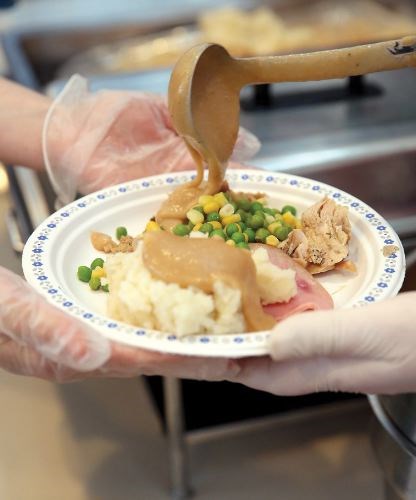A mysterious influx of those in need over the past month is leaving the St. Vincent de Paul soup kitchen busier than ever.
More than 400 meals are now being served each day Bernie Goold, the social agency's long-time president, said Wednesday - a level she's not seen in the 35 years she's been at the location.
Prior to the wildfires, about 300 to 320 meals "was a very busy week for us."
With the evacuation, she said the pace rose by about 50 to 60 meals a day and has stayed there ever since. Then, beginning about two to three weeks ago, it rose by about 50 again.
In part, Goold attributed the jump to an extra week welfare recipients had to wait to get their cheques, but that's not the whole answer in her opinion.
"Usually, when it's a five-week welfare period, which we just finished - they got their cheques today - we see an influx but not for the length of time we've seen it, like two or three weeks before," she said.
But other than to say a lot of them are young, Goold is unable to pin the cause down.
"Because of the nature of our society and the generosity of the people of Prince George, we respect them as guests," she said. "They're not clients - we don't get funding to feed them - they're our guest and unless we chat to them, we don't do any kind of thing like a means test."
Willy Ens, who has used the agency's services since 2013 when health issues forced the 65-year-old out of a job in the Alberta oilpatch, said he's also noticed the increase. Like Goold, he said many of the newcomers are evacuees but not all, and is at a loss to explain the most-recent jump.
"You notice it because they have a maximum of 85 people so they have to go into a second or a third seating," Ens said as he leaned against a bike rack next to the agency's building at Second and George.
The impact has not been limited to the soup kitchen, according to Goold, who said more than the usual number have been sleeping on the streets and it's been noticed.
"You know, the people on Third Avenue behind their buildings, around our building," Goold said.
"It really is a lot of people living on the streets, not going in the shelters, and I don't know the reason, it's baffling us all."
So far, the kitchen has been able to provide enough food to keep them fed. St. Vincent receives about 80 per of its donations over about six weeks starting in mid-November, "but people have been very generous, seeing our long lineups."


